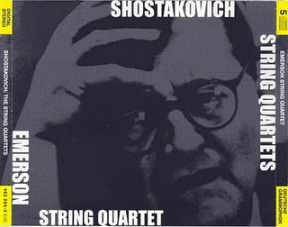Dmitri Shostakovich - Complete String Quartets (1999)
Dmitri Shostakovich - Complete String Quartets (1999)

Quartet for Strings no 1 in C major, Op. 49
Quartet for Strings no 2 in A major, Op. 68
Quartet for Strings no 3 in F major, Op. 73
Quartet for Strings no 4 in D major, Op. 83
Quartet for Strings no 5 in B flat major, Op. 92
Quartet for Strings no 6 in G major, Op. 101
Quartet for Strings no 7 in F sharp minor, Op. 108
Quartet for Strings no 8 in C minor, Op. 110
Quartet for Strings no 9 in E flat major, Op. 117
Quartet for Strings no 10 in A flat major, Op. 118
Quartet for Strings no 11 in F minor, Op. 122
Quartet for Strings no 12 in D flat major, Op. 133
Quartet for Strings no 13 in B flat minor, Op. 138
Quartet for Strings no 14 in F sharp major, Op. 142
Quartet for Strings no 15 in E flat minor, Op. 144
Pieces (2) for String Quartet
Emerson String Quartets
If you like your Shostakovich quartets big, brawny, and a bit brutal, you'll like the Emerson Quartet's Shostakovich quartets. The Allegros are muscular, with sharp attacks, strong sforzandos, and relentless rhythms. The Passacaglias are powerful, with massive sonorities, monumental structures, and inexorable tempos. And the Allegrettos are aggressive, with ironic accents, sarcastic tones, and mordent tempos.
If you like your Shostakovich quartets smooth, suave, and very soulful, you'll probably like the Emerson Quartet's Shostakovich quartets. The Andantes are tuneful, with long lines, supple harmonies, and warm colors. The Adagios are soaring, with arching themes, aching harmonies, and brilliant colors. And the Largos are penetrating, with expressive counterpoint, weighty sonorities, and burnished colors.
If, however, you like your Shostakovich quartets straight, no ice, no chaser, you'll probably not like the Emerson Quartet's Shostakovich quartets. The Emerson seems unable to restrain itself and too often adds too much of itself to the scores. The rawness of the chords in the Fourth Quartet's opening movement? The Emerson's idea. The nostalgia of the tone in the Ninth Quartet's slow movement? The Emerson's notion. The sentimentality of the closing bars in the Fourteenth Quartet's finale? The Emerson's interpolation. For Shostakovich straight, try the Beethoven Quartet. It premiered almost all the quartets and learned their meaning from the composer. For Shostakovich plus, try the Emerson Quartet. DG's live sound is crisp, clean, deep, and detailed with the audience intruding only with energetic applause. ---James Leonard, Rovi
Keith Jarrett, known primarily as a jazz pianist, has exhibited a great deal of courage with his recording of classical "standards" such as this one. By doing so he opens himself to accusations of dillitantism from critics, who seem almost universally inclined to place artists into narrow categories, only to label as "pretentious" any performers who try to expand their horizons...a process that usually reveals the critics' own pretentions and ignorance.
A recording like this is particularly risky business for Jarrett, who has always been controversial with critics for his unique, individualistic style, his aggressive self-assurance and unwillingness to "suffer fools gladly", and his well-known tendency to "sing" along with his jazz improvisations. Add to everything else the fact that a "standard" of this particular work already exists (in this case Tatyana Nikolaieva's Grammy-winning interpretation), and this recording faces quite an uphill battle.
Proving, however, that he is a superior artist, Jarrett's recording of the 24 Preludes and Fugues demolishes all of these would-be objections. Jarrett's interpretation of Shostakovich is perhaps the clearest, most articulate recording ever made of these works, revealing subtlties of texture and mood that previously remained hidden on the printed page...without sacrificing anything in terms of emotion. Part of the credit for this clarity goes to the superior ECM technical recording skills, but any fan of Jarrett's musicality (both expressiveness and clarity) in his jazz playing will find the same qualities here. Incidentally, one thing you won't find here is Jarrett's "singing"...it's missing from all of his classical work.
As is the case with his other superb classical recordings, the real triumph here is that of Jarrett as classical performer. Not only does this work stand completely on its own (in other words, it's not a "classical recording by a jazz artist" but a totally serviceable interpretation in its own right), it also adds significantly to our understanding of Shostakovich's composition. It's not the same work as the Nikolaieva classic, and shouldn't be excessively compared to it. It makes its own statement, along with Keith Jarrett, the classical artist. In any idiom, Keith Jarrett will be remembered as one of the great pianists of our time. ---Doc Sarvis, amazon.com
download: uploaded yandex 4shared mediafire solidfiles mega zalivalka filecloudio anonfiles oboom
Last Updated (Tuesday, 06 May 2014 20:27)
